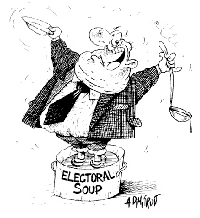Social-Liberal Party

Historic background
Leaders of the Social-Liberal Party motivated the appearance of the new formation on the political scene of the Republic of Moldova as a necessity of being responsible for defiance provoked by popular disappointment given by government in the 1991-2000. They consider that this discontent and distrust in democratic political forces and their leaders called such amount of the votes in favor of the Party of Communists of the Republic of Moldova (PCRM), which promised to come back to the "welfare" of the Soviet Union.
A group of intelligentsia, students, representatives of the civil society and business community formed the Social-Liberal Initiative Group headed by Oleg Serebrian. The Manifest released by the members of the initiative group on March 12, 2001 highlighted the intention to found a party, namely Social-Liberal Party, on the liberal niche of the political spectrum.
The Christian-Democratic Women's League, founded in 1990, was the first party to salute the initiative and subscribe to its principles. The National Youth League of Moldova, founded in 1991, followed the example shortly after.
The Founding Congress of the SLP was convened on May 9, 2001, on the European Day. The Congress adopted the party bylaws, elected the governing bodies as well as the party Chair - Oleg Serebrian.
SLP aims to establish a new political elite in the Republic of Moldova formed of young people, representing various religions and linguistic minorities and functioning according to some new principles enabling the party to avoid its stiffening.
Driven by the goal to secure broad representation in the territories, the SLP started establishing party structures at the grassroots, including in the "wastelands" of political representation. The major goal of the SLP's campaign of recruiting new members was to attract activists interested in solving community problems, activists well respected and appreciated by the community.
Another priority direction of the SLP activity is to monitor the Communist governing and to express its standpoint with regard to the actions of the country leadership. An illustration of this is the SLP boycott of the early local elections set by the Parliament for April 7, 2002 and later on outlawed by the Constitutional Court. Party's positions are made public by its representatives in media outlets (including the local ones) as well as during political events, one of the most important being the rally In Europe without Communism held on February 24, 2002 jointly with the European Movement of Moldova and other civic organizations.
On December 1, 2002 the X Congress of the SLP endorsed the decision of the Permanent Bureaus and National Councils of the Social-Liberal Party and Party of Democratic Forces on the merger of the two parties. The Congress voted amendments to the renewed Social-Liberal Party program and bylaws, elected the Honorary Chair, Deputy Chairs for Foreign Relations and for Political Affairs, and reconfirmed in their positions Deputy Chair on Economics and on Organizational Matters. The Congress also elected the National Censor and Ethics Commission.
Social-Liberal Party:
Program /
Governing bodies /
Statistics /
Participation in elections
|




